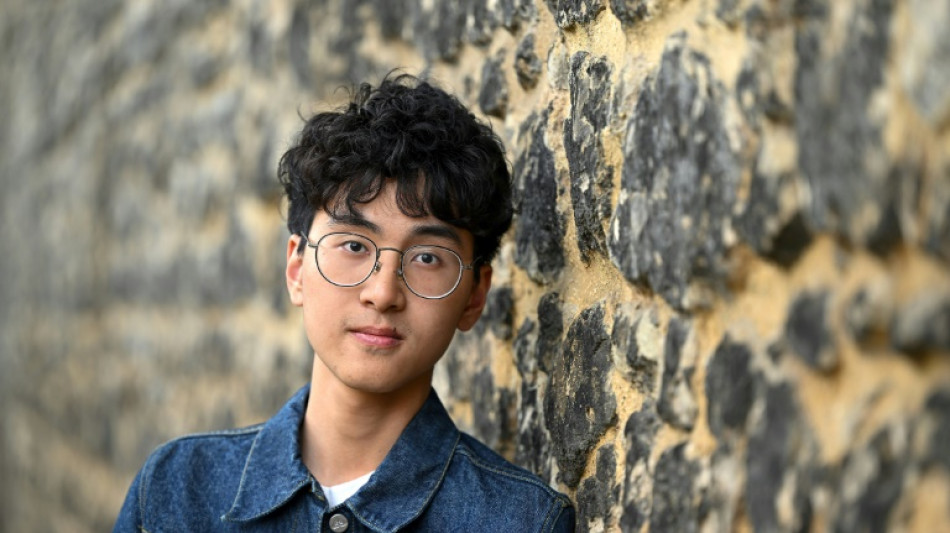
-
 Paw patrol: Larry the cat marks 15 years at 10 Downing Street
Paw patrol: Larry the cat marks 15 years at 10 Downing Street
-
India plans AI 'data city' on staggering scale
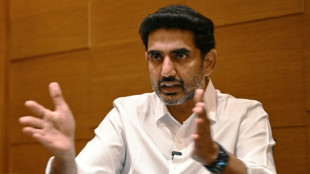
-
 Jamaica's Thompson-Herah runs first race since 2024
Jamaica's Thompson-Herah runs first race since 2024
-
Top seed Fritz to face Shelton for ATP Dallas Open title

-
 Crash course: Vietnam's crypto boom goes bust
Crash course: Vietnam's crypto boom goes bust
-
Ahead of Oscars, Juliette Binoche hails strength of Cannes winners

-
 US cattle farmers caught between high costs and weary consumers
US cattle farmers caught between high costs and weary consumers
-
New York creatives squeezed out by high cost of living

-
 Lillard matches NBA 3-point contest mark in injury return
Lillard matches NBA 3-point contest mark in injury return
-
NBA mulling 'every possible remedy' as 'tanking' worsens
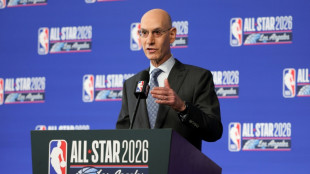
-
 Team USA men see off dogged Denmark in Olympic ice hockey
Team USA men see off dogged Denmark in Olympic ice hockey
-
'US-versus-World' All-Star Game divides NBA players
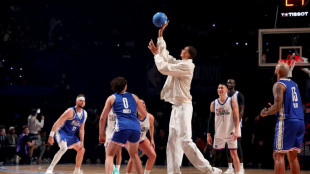
-
 Top seed Fritz beats Cilic to reach ATP Dallas Open final
Top seed Fritz beats Cilic to reach ATP Dallas Open final
-
China's freeski star Gu recovers from crash to soar into Olympic big air final

-
 Braathen wins unique Winter Olympic gold for Brazil, Gu overcomes scare
Braathen wins unique Winter Olympic gold for Brazil, Gu overcomes scare
-
Lens run riot to reclaim top spot in Ligue 1, Marseille slip up

-
 Last-gasp Zielinski effort keeps Inter at Serie A summit
Last-gasp Zielinski effort keeps Inter at Serie A summit
-
Vinicius bags brace as Real Madrid take Liga lead, end Sociedad run

-
 Liverpool beat Brighton, Man City oust Beckham's Salford from FA Cup
Liverpool beat Brighton, Man City oust Beckham's Salford from FA Cup
-
International crew arrives at space station

-
 Australia celebrate best-ever Winter Olympics after Anthony wins dual moguls
Australia celebrate best-ever Winter Olympics after Anthony wins dual moguls
-
Townsend becomes a fan again as Scotland stun England in Six Nations

-
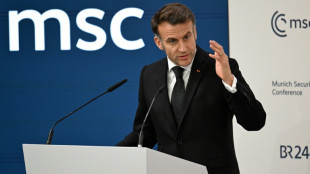 France's Macron urges calm after right-wing youth fatally beaten
France's Macron urges calm after right-wing youth fatally beaten
-
China's freeski star Gu recovers from crash to reach Olympic big air final

-
 Charli XCX 'honoured' to be at 'political' Berlin Film Festival
Charli XCX 'honoured' to be at 'political' Berlin Film Festival
-
Relatives of Venezuela political prisoners begin hunger strike
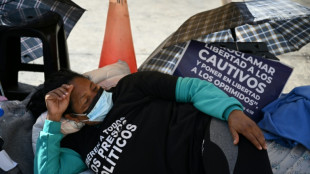
-
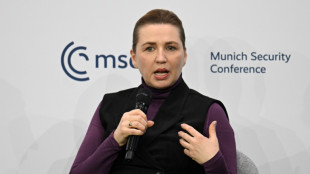 Trump's 'desire' to own Greenland persists: Danish PM
Trump's 'desire' to own Greenland persists: Danish PM
-
European debate over nuclear weapons gains pace

-
 Newcastle oust 10-man Villa from FA Cup, Man City beat Beckham's Salford
Newcastle oust 10-man Villa from FA Cup, Man City beat Beckham's Salford
-
Auger-Aliassime swats aside Bublik to power into Rotterdam final

-
 French prosecutors announce special team for Epstein files
French prosecutors announce special team for Epstein files
-
Tuipulotu 'beyond proud' as Scotland stun England

-
 Jones strikes twice as Scotland end England's unbeaten run in style
Jones strikes twice as Scotland end England's unbeaten run in style
-
American Stolz wins second Olympic gold in speed skating

-
 Marseille start life after De Zerbi with Strasbourg draw
Marseille start life after De Zerbi with Strasbourg draw
-
ECB to extend euro backstop to boost currency's global role
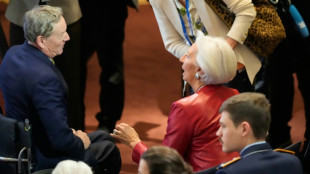
-
 Canada warned after 'F-bomb' Olympics curling exchange with Sweden
Canada warned after 'F-bomb' Olympics curling exchange with Sweden
-
Ultra-wealthy behaving badly in surreal Berlin premiere

-
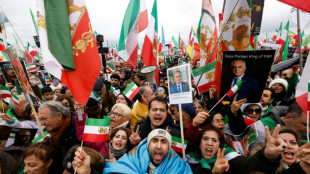 250,000 at rally in Germany demand 'game over' for Iran's leaders
250,000 at rally in Germany demand 'game over' for Iran's leaders
-
UK to deploy aircraft carrier group to Arctic this year: PM
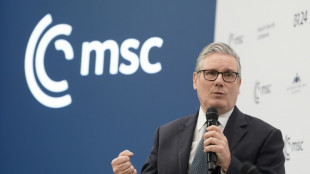
-
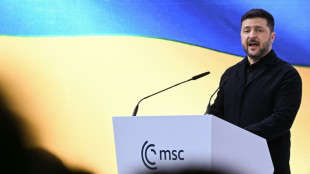 Zelensky labels Putin a 'slave to war'
Zelensky labels Putin a 'slave to war'
-
Resurgent Muchova beats Mboko in Qatar final to end title drought

-
 Russia's Navalny poisoned with dart frog toxin: European states
Russia's Navalny poisoned with dart frog toxin: European states
-
Farrell hails Ireland's 'unbelievable character' in edgy Six Nations win

-
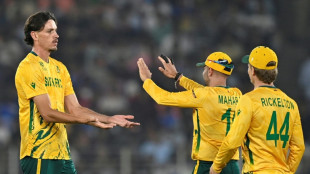 Markram, Jansen lead South Africa to brink of T20 Super Eights
Markram, Jansen lead South Africa to brink of T20 Super Eights
-
Guehi scores first Man City goal to kill off Salford, Burnley stunned in FA Cup

-
 Swiss say Oman to host US-Iran talks in Geneva next week
Swiss say Oman to host US-Iran talks in Geneva next week
-
Kane brace helps Bayern widen gap atop Bundesliga

-
 Ireland hold their nerve to beat gallant Italy in Six Nations thriller
Ireland hold their nerve to beat gallant Italy in Six Nations thriller
-
European states say Navalny poisoned with dart frog toxin in Russian prison


'Private rebellion': Hong Kong's anglophone poets gain recognition abroad
As a teenager stuck in Hong Kong's pressure-cooker school system, Eric Yip found his escape in writing poetry -- never dreaming that one day his work would go on to win a top prize halfway across the world.
In March, at the age of 19, he became the youngest ever winner of the United Kingdom's National Poetry Competition.
He beat more than 7,000 contenders from 100 countries and placed himself squarely among a cohort of Hong Kong poets writing in English that has found increasing recognition over the past decade.
Now an economics undergraduate at Cambridge, Yip recalled the "liberating" feeling of reading material that had nothing to do with high-school English classes taught according to a strict syllabus.
"Writing poems was a private rebellion against this regimented approach," Yip told AFP.
His award-winning "Fricatives" begins with the narrator taking English lessons as a "spectacled boy with a Hong Kong accent" and opens up to explore issues of language, race, sex and migration.
A former British colony, Hong Kong has developed its own literary tradition in both Chinese and English, although anglophone poets remain a minority and receive little establishment support.
"There's always a certain estrangement one feels when writing in a second language", Yip said, but English has now become his "private language" in which words flow more naturally.
"What matters to me is the emotional truth of writing. If English is what will get me closer to that, then I'll keep using it."
- Queer poetry in spotlight -
Anglophone poets who spoke to AFP agreed their output was hardly mainstream, but said writing from the margins allowed them to challenge Hong Kong's norms.
Yip's win caused a stir in Hong Kong media, though most newspapers were silent on the poem's description of a gay encounter -- mirroring the mixed reactions of some local readers.
"The sexual element and the poem's queerness are absolutely essential," Yip said.
"I was thinking about the parallels with oracy and colonialism, how it all ties back to submission."
Other Hong Kong poets who have found success in tackling LGBTQ themes include Nicholas Wong, whose collection "Crevasse" won one of the best-known prizes for queer literature worldwide in 2016.
His latest collection was a finalist for the same Lambda Literary Awards' gay poetry prize this year.
Wong said his writing tapped into themes about "everyday desire" in a way he found immediate and spontaneous.
In a recent poem, the speaker imagines inviting his father to his wedding held in Taiwan -- the only jurisdiction in Asia where gay marriage is legal.
Wong, 43, who teaches at a local university, said he had witnessed Hong Kong's community of poets grow into something "more substantial, less fragile".
Having been a published poet for over a decade, Wong said he felt emboldened to experiment with language in a way that might feel obscure to Western readers.
"Maybe because it's my second language, I don't assume it will love me back. So I can do whatever I want with it and to it," he told AFP.
- Poetic dissent -
Academics have shown "growing interest" in Hong Kong poetry to understand how residents feel about the city's social and political transformation, according to scholar and poet Jennifer Wong.
The massive citywide democracy protests three years ago -- and Beijing's subsequent crackdown --proved a watershed.
The movement included violence that some experts say left many quietly traumatised, while solidarity between protesters gave rise to outbursts of creativity.
Last year anonymous poets behind the US-based Bauhinia Project published "Hong Kong Without Us", which they described as a crowdsourced "found poetry" book.
During the protests, they translated snippets of Hong Kongers' voices -- from social media, graffiti, news articles and public submissions -- and distributed them on postcards in the United States.
"We were especially interested in... how the urgency of the politics holds out the potential for a vulnerable, emotional voice," one of the poets told AFP.
"We were just trying to articulate the voice that we imagined to be the best of Hong Kong."
The project blossomed into a book and has become an access point for US readers to "engage emotionally" with Hong Kongers beyond news headlines, the poet said.
"Hong Kong Without Us" concludes with a postscript saying the book is contraband.
In 2020, Beijing imposed a sweeping national security law in Hong Kong that has criminalised most dissent, and many protest-themed literary works have been taken off bookstore shelves.
The poet said he was worried that the repressive political climate would seal shut the "narrow crack" for Hong Kongers to express emotional vulnerability.
"I don't know... what's going to happen in the future when that already slim crack might be gone."
F.AbuShamala--SF-PST

